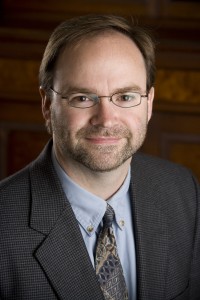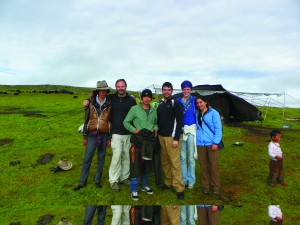Trip to China challenges assumptions for professor, students

The students, their teacher and their translator were riding small, spunky horses to a nomadic camp of Kham Tibetans in southwest China. It was wide-open land, said Maryville College senior Jonathan Salkeld, grasslands situated above the rugged mountaintops they’d driven past days ago. There, in that remote and magical landscape, something happened that astounded the MC student from Knoxville: the translator reached into his pocket, pulled out a cell phone and began a conversation with the nomads.
Such was the nature of the learning experience of Dr. Scott Henson, assistant professor of political science, and the three students — Salkeld, Arianna Hakiman and Amy Newell — who spent two weeks this past summer researching the economic, political, social/cultural and environmental impact of globalization on Tibetans living in the Sichuan province.
What the students and the professor had read about the effect of China’s economy and government upon these indigenous people was generally negative. What they found was a mixed bag.
For example, said Salkeld, the nomads rode dirt bikes, turning a six-hour journey on horseback into a 30-minute commute to town for supplies. At the same time, Tibetans were aware of the environmental impact of the bikes on the grasslands where they herded yaks.
“They wanted to stay true to their roots — herding yak — but they also picked up technology that made their lives easier,” said Salkeld.
Henson first became interested in China when he worked for a textile company soon after graduating from Gardner-Webb University in North Carolina. Traveling on business mostly to urban areas, he noted the poor conditions of the factory workers and began wondering how the migration from the villages to the cities was affecting the indigenous cultures.
As a professor at Maryville College, he first took students to China in 2008 to study the Dong (Kam) people of Guizhou province. On that trip, he began to see that the effect of industrialization and globalization was not all negative and that indigenous cultures sometimes adapted to changes in unexpected ways.
For example, the satellite dishes that the government gave to the villagers and the TVs they obtained were used more for videotaping and watching performances of indigenous musicians than listening to propaganda from the government.
“It was just that box in the corner that they occasionally turned to for diversion,” Henson said.
The 2011 trip and research, funded by an AsiaNetwork/Freeman Foundation grant, focused on two areas: the frontier town of Tagong and the nomad camps. Each student helped prepare for the trip to China by assisting with grant applications and completing forms for the approval of their research by the Institutional Review Board (IRB).
Henson was interested in Tagong and the nomad camps because of the influx of Chinese immigrants into the area and their development of commercial enterprises such as shops, mining and forestry. Again, he expected mostly negative outcomes. And once again, he found a mixture of positive and negative.
Salkeld, in particular, remembers a woodworker who was so negative about the Chinese government’s impact on the environment that he made the translator a little nervous.

At the same time, the new roads, the motorcycles and the shops made some parts of life easier for Tibetans.
On this trip, as on the first trip, Henson and the students interviewed Tibetans, observed their day-to-day lives and participated in their culture, each of these activities designed to gather information. The results not only countered some of their assumptions but also left them with some worrisome questions. After the first trip, Henson wondered if the Dong people understood the future implications of some of the changes in their lives. Was it his place to warn them?
Newell, a Spanish major who graduated in May, said she realized she had “no right” to travel to a place and judge it based on her own Western standards of what in a culture should be preserved.
“It is not my place to make the judgments,” she added. “I can only give my observations.”
Each student derived valuable experience not only in what they learned but how they learned it. At the nomad camp, Hakiman milked a yak, Newell fed a fire with yak dung for cooking and warmth, and Salkeld helped to herd the valuable animals. For a couple of days, Newell sat in the center of Tagong and counted the cars and trucks and motorcycles that went past. She also counted the number of people who entered the Buddhist temple, separating the tourists from the locals by noting who paid to get in.
As a result of her interviews in Tagong, Hakiman noted that “there are some people here who are really happy with development. They think that it’s bringing in more money, it’s making their lives easier…and then there’s another group, this individual from the woodworking shop and some of the monks who feel like technology and development are harming the culture and causing people to lose sight of their values.”
Salkeld talked about the process of adapting and being flexible in one’s research methods. It was important, he said, for group members to acclimate themselves to the people, to get to know them before they began interviewing. One place that became important, said Salkeld, was a bar where the locals played pool with the Maryville College professor and students.
Hakiman, an international studies major from Murfreesboro who also graduated in May, learned that getting perceptive, in-depth information took time: “Each time, it was apparent that some level of mutual respect and trust had been established to allow for a successful interview. I found that really inspiring,” she said.
Newell said, “It is one thing to read about globalization in a class at Maryville College, to read what the scholars have to say on the subject and to have small debates about the topic, but it is quite another to sit in a tent made out of yak hair, be kicked by baby yaks sleeping next to you and see the motorcycle propped up in the corner.”
For Hakiman, being able to talk to people and learn about the dynamic changes taking place as a result of development was information that only an actual trip could give her. “We were able to see the extent to which the members of that community were active protagonists of the developments occurring or whether they were more passive, simply experiencing and coping with the changes that they saw coming.”
The research findings of the group will become a paper that Henson will present at a conference and publish.
Just as importantly, the trip itself will serve as one of several examples of research methodology that Henson is gathering for a documentary on undergraduate research in the social sciences. He describes it as “academic reality TV.”
The documentary will present footage from projects like the 2011 trip to Sichuan in order to show students different ways to gather information. They’ll see Hakiman milking a yak as an example of participatory research. Newell will demonstrate the observation method as she sits on a hill and notes the difference in the Tibetan and Chinese architecture in the town below.
In all, Henson plans to include 10 episodes, including his own travel projects, as well as those of Dr. Frances Henderson, Dr. Mark O’Gorman and Dr. Ariane Schratter.
The professor also is working on a book based upon the research he has done and more case studies he is formulating. He’s already decided on a title: “Prosperity and Preservation: the Impact of Globalization on Indigenous Minorities.”
Henson plans to continue taking students on trips to China and elsewhere because, he said, he enjoys “sharing experiences abroad with other people and seeing their reactions.” He hopes this kind of adventurous study activates students in some way, whether it’s an increased awareness of issues faced by faraway, unfamiliar cultures, or whether students decide to involve themselves politically in these issues and go back to the areas to work or help out.
Salkeld, a physical education major, is entertaining that possibility. One day on the trip Salkeld said he came upon a group tearing down an old building and transporting the wood for storage. He began to help them, and from this simple task realized that helping people —humanitarian work — made him feel good.
He met an international group working at a hostel and appreciated how they were helping the Tibetan people adapt to the changes they were undergoing. He thinks he might like to join them someday.
Newell, who is in the beginning stages of applying to graduate school in Europe, said the trip “resparked an interest in globalization and development … and gave me time to think, to observe and to learn from one of Maryville’s best professors.”

